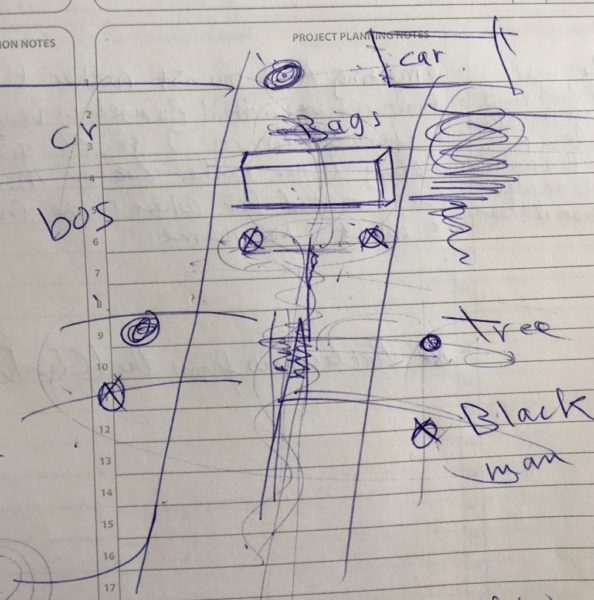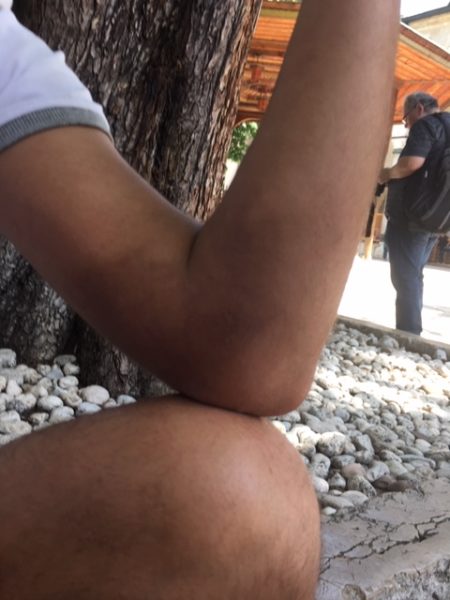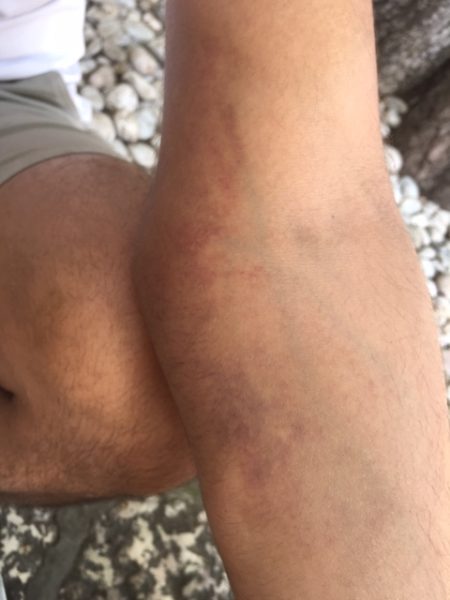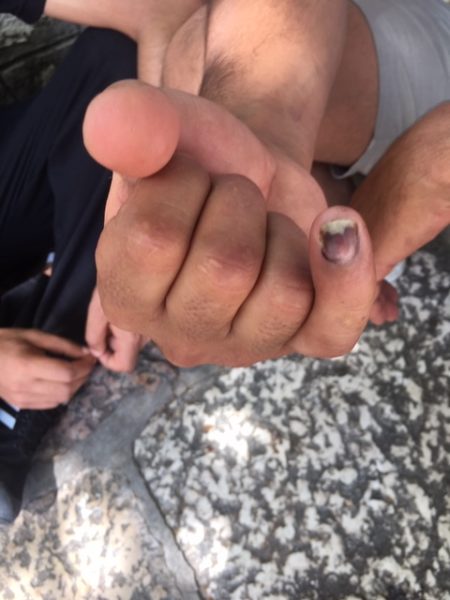DOUBLE REPORT
| 23.06.2019 | Kupska Dolina, Croatia | Border Violence Monitoring Network | 45.4761918, 14.9003791 | Croatia | Bosnia | yes | yes | yes | yes | no | no | 4 - 35 | 14 | Syria, Iraq | photos taken, personal information taken, denial of medical care | 11 Croatian police | beating (with batons/hands/other), kicking, gunshots, destruction of personal belongings, theft of personal belongings, reckless driving | 2 Croatian police in police car; 2 Croatian police driving van, 7 Croatian police at border - 5 wearing black ski masks |
A group of fourteen individuals, including four minors and four women, from Iraq and Syria departed from Velika Kladuša (BiH) and walked to the Croatian border around 6:00PM. They walked for ten days in the Croatian forest, following the GPS. They walked up and down mountains and across rivers during this time. On the third day there was "crazy rain" and "lighting that arrived to the ground." All of their possessions were soaking wet with water. After four days in the forests they had finished all of their food. They found an abandoned mountain house and found water inside to drink. After eight days, the husband and wife in the group took their two youngest children (ages 5 and 7 years old) and turned themselves into the police. There other two children (ages 13 and 15 years old) stayed with the rest of the group. After ten days of walking through Croatia, the group reached the Kolpa River on the Slovenian border around 5:00AM. They saw Slovenian police on the other side of the river and so they waited until the police left to attempt the crossing. Once the Slovenian police left, one man from the group went down to check the road on the Croatian side of the border and at this point two Croatian police were sitting under a bridge and saw the group member checking the road. There were two Croatian police officers wearing blue uniforms. They told the group members to come out of the forest, but the group did not want to. The police carried two guns - one big and one small - which they fired into the air when the group resisted their orders to come down from the forest. The police told the group members to sit on the ground and to take out their phones and money and put them on the ground. The group waited one hour sitting on the ground before two more police arrived driving a big white van without windows. The police loaded the group into the van and drove them 30 minutes to a police station. They drove recklessly, going very fast and then braking suddenly. The group was put in a jail cell for two to three hours where their photographs and personal information was taken. The fifteen and thirteen year olds in the group were taken by the police to the closed camp in Zagreb where there parents and younger siblings were put after they left the group and turned themselves into the police two days earlier. The respondent asked the police to help one of the women in the group who was diabetic and needed medicine. The police refused to give her any medicine. They did, however, give the group water, bread and biscuits while they waited in the jail cell.
"I asked the police for asylum, they said 'Okay, we'll call the government to accept you.'"
Instead, the police loaded them into a van and drove them for two and a half hours to the Bosnian border. There were two police driving the van and five officers wearing black masks waiting for them at the border."The Croatian police are same as Da'esh. Everywhere we go there is Da'esh."
The police had given back the group members' mobile phones at the police station, but once the van is stopped they confiscated them again. Several individuals gave their phones to the woman in the group who put them in her bra. Because she was ill, the police escorted her out of the van and told her to wait for the rest of the group a one hundred meters away from where the van was parked.(figure 1)
Once the remaining phones were handed over, the police smashed them while laughing. The police made a pile of all the group's bags as well. Then the police made two lines from the back of the van. There were two officers standing on either side of the van and they were dressed in normal police clothes and were not wearing black masks. They shouted "Go" and in groups of three, the group members exited the van. They first picked up their bags from a pile, then climbed over a small barrier that marked the border between Croatia and Bosnia (see figure 2).
(figure 2)
The two officers without masks gave each individual a light strike with their batons, which the respondent believed was to encourage them to run fast passed the officers in black masks. The respondent described that the officers wearing black masks ran out from behind the trees and used wooden sticks that were one meter long to hit the group members."I heard my friend go 'ah, ah' and the Da'esh man said 'fuck you, you shit'"
Two group members fell on the ground and the black masked officers struck them seven or eight times each."[The police] beat them like they wanted to kill them."

(figure 3)
Once all members made it back to the Bosnian side of the border, they waited at the meeting point with the sick woman. The police then fire the gun into the air three times. Unable to pay for a taxi, they then walked 20 kilometers back to Velika Kladuša.
(figure 4)

